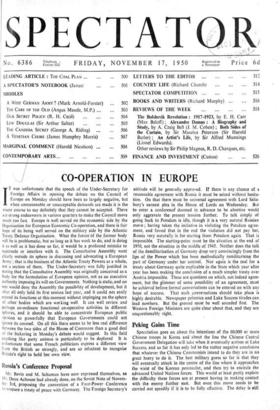CO-OPERATION• IN EUROPE
IT was unfortunate that the speech of the Under-Secretary for Foreign Affairs in opening the debate on the Council of Europe on Monday should have been so largely negative, but when unreasonable or unacceptable demands are made it is the wisest course to say definitely that they cannot be accepted. There are strong endeavours in various quarters to make the Council move much too fast. Europe is well served on the economic side by the Organisation for European Economic Co-operation, and there is fair hope of its being well served on the military side by the Atlantic Treaty Defence Organisation. What the future of the former body will be is problematic, but as long as it has work to do, and is doing it as well as it has done so far, it would be a profound mistake to supersede or interfere with it. The Consultative Assembly went clearly, outside its sphere in discussing and advocating a European Army ; that is the business of the Atlantic Treaty Powers as a whole, not a section of them. The Under-Secretary was fully justified in stating that the Consultative Assembly was originally conceived as a body for the formulation of European opinion, not as an executive authority imposing its will on Governments. Nothing is static, and no one would deny the Assembly the possibility of development, but it after all only held its first session last year, and it could not easily extend its functions at this moment without impinging on the sphere of other bodies which are working well. It can well review and perhaps co-ordinate functional co-operative activities in different spheres, and it should be able to concentrate European public opinion so powerfully that European Governments could not ignore its counsel. On all this there seems to be less real difference between the two sides of the House of Commons than a good deal of the bickering in Monday's debate would suggest. In this field anything like party animus is particularly to be deplored It is unfortunate that some French politicians express a different view from the British so strongly, and are so reluctant to recognise Britain's right to hold her own view.


































